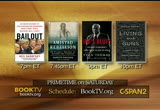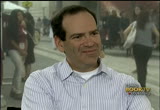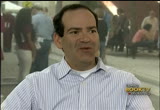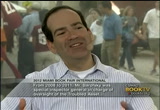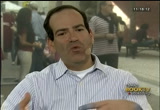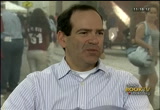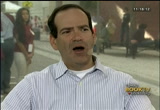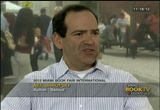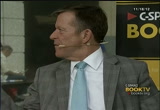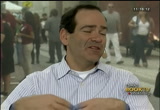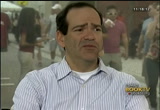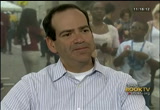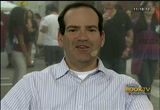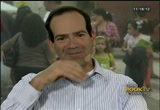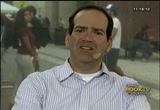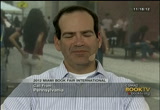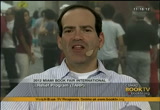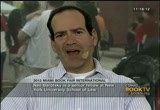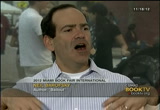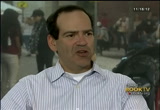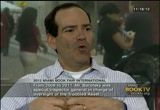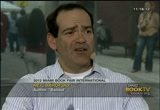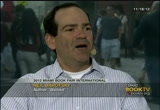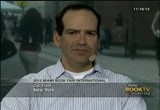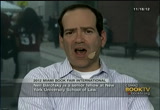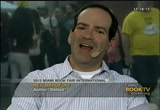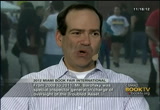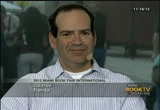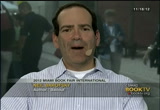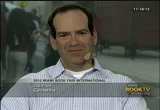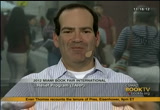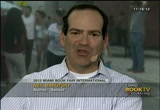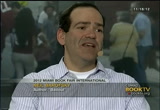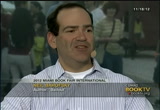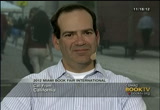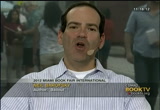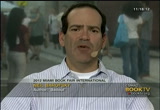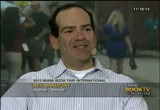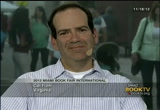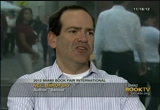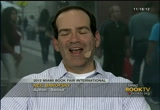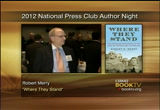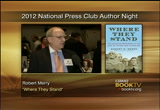tv Book TV CSPAN December 22, 2012 7:00pm-7:45pm EST
7:00 pm
neil barofsky talks about his book, bail out an inside account of how washington amended main street while rescuing wall street. he argues that the 700 billion-dollar troubled asset relief program or t.a.r.p. bailout fund was mishandled. it's about 40 minutes. >> joining us now is neil barofsky, former inspector general for t.a.r.p.. you saw him earlier on the panel. here's the cover of his bestseller. it's called bailout. ..
7:01 pm
7:02 pm
>> what was the date he that you started? >> december 15, 2008. >> what are your politics? you the bush administration, essentially, but what are your politics? >> i have been a lifelong democrat. since i was old enough to go. vote. i have always been a registered democrat. it is actually kind of funny. when the u.s. attorney approach me and asked me if i was interested in the job, i was going to different excuses as to why didn't want to go to washington. i was very happy being with a prosecutor. i was getting married. finally, when all those arguments had failed, i said in a very dramatic way, by the way, you know that i am, in fact, a registered democrat. and he kind of winced. and i thought i came back and said i contributed to barack obama two weeks ago to his campaign. [laughter] but it was not a political point, it was a narrative that appointment. they thought i had the right experience to protect us giant bailout from criminal fraud.
7:03 pm
>> neil barofsky, when you look back at the administration itself, not how it was administered, but the legislation, what were some of the flaws come interview? >> i think what often happens, it is understandable given the sense of emergency this was a hastily crafted bill. one of the things as it had a lot of policy goals in the bill. but it didn't have the mechanisms -- he didn't mandate certain mechanisms to carry out those policies. for example, the idea behind t.a.r.p. is that it was going to help expand the economy. money wasn't is going to the bank, it was going to the bank's for the purpose of broader economic recovery. but he gave a tremendous amount of discretion to the treasury department to carry out this policy. to ultimately adopt these policies that disconnected, you know, the program goals and how the program perform. so we have a housing initiative that was supposed to help
7:04 pm
4 million people but only helped about a hundred something thousand out of that group. a lot of times, too much discretion was given the treasury. and that led to not really execution all that well. some the more important mainstreet goals of the program. >> 202 is the area code. you can participate in this conversation with neil barofsky. the phone numbers are on the bottom of the screen. please call if you are in any of the time zones. he worked for a month and a half or so what was your relationship with the two gentlemen? >> i found it very accommodating. he's warming into office.
7:05 pm
he was very nice from the beginning. he really wanted here where i was coming from. he wanted our input at that meeting about the auto bll. what protections we thought were necessary to protect from fraud. we had serious tension as we were pushing for more transparency and more work conditions. we were certainly pushing back. personally, i did find that he was interested in what we have to say is one of his chief lieutenants. he wanted to make this work. our relationship with secretary timothy geithner was different. it's pretty much dismiss it from day one. he wasn't terribly interested in hearing from me or our officer working with the office. over the course of two plus years, i had to one-on-one meetings with him. one was about 30 seconds, and the other was a longer affair
7:06 pm
where he cursed me out for suggesting that he was anything other than sufficiently transparent. i will use the actual language, but i'm the most transparent secretary of the history of the country, and he couldn't believe that i'm suggesting otherwise. it had a lot of nastiness behind the scenes. weeks of false information to the press document is treasury department. a lot of dirty washington political tricks. i don't know if he was personally responsible for that. but under his treasury department, we saw a lot more that under secretary geithner than we did with the former secretary. >> what grade would you give the administration of t.a.r.p.? >> oh, it has to be a grade f. a lot of people say that we didn't have a bigger financial crisis and that's true. but ultimately, the program wasn't just about saving the
7:07 pm
financial system for the sake of saving the financial system. it was to stir up broader economic recovery. it was to preserve homeownership by keeping people in the home. it was, as we were told, the money was going to the bank. so it would go into the economy. they would be less visible and create less misery throughout the country. so it didn't achieve those major policy goals. even with the status quo, what did we really save? we saved a a broken system of two big buildings. thinking that t.a.r.p. would make them even bigger. in many ways, we are still on a path to another financial crisis because of the decisions were made back in 2008 and 2009 and 2010. >> before we get started and before we go to calls, a viewer walk by here and saw the book and said, make sure to ask them about the fiscal cliff. whether or not you have an opinion, whether you have some
7:08 pm
knowledge or not -- what would you like to say about the fiscal cliff? >> you know, i think the fiscal cliff is a great nickname. but i think it is sort of greedy instance of an emergency. like if something doesn't happen by january 1, the entire economy will go into the next great profession. that's not really what's going to happen. there is some great degree of urgency. this is sort of a man-made crisis, i think. i don't think that we have this crushing budget issue that has to be dealt with at this precise moment, or the world will end. i think of seville at a very anemic recovery. there are a lot of people really struggling out there across the country. but our priority should be strengthening our safety net during times of economic duress. now is not the time, in my opinion, to be contemplating significant cuts in things that a lot of struggling working class people who have lost grip
7:09 pm
of the middle class, spending cuts that are talked about, it could really have a negative impact on people at a time when they need it most. i am much more concerned about increasing getting people out of poverty, rejecting the unemployed, whether or not it is another reader six or nine months that we deal with these issues. i will think would think ultimately they will kick the can down the road. then we will have another fiscal cliff in your view, that federal economic policies that? >> in front of the regulation. we had a banking system that existed from, you know, the ashes of the great depression. regulatory reforms that we had under fdr, they protected our financial system for decades upon decades.
7:10 pm
when he saw through the end of the clinton administration is sort of dismantling a lot of those protections. and as a result, you saw an increase of risk in the financial sector, and these explosions, these monstrous frankenstein banks. those that are so big that the failure of anyone which has been deemed to bring down the entire financial system. we saw this enormous crisis. so i do think that washington has played a role with deregulation. also just bad regulation. by being too overly deferential with financial institutions, looking the other way, really egregious misconduct that led to the crisis that had created this giant housing bubble of the exploded so painfully. i think the regulators do certainly share the burden of blame along with the financial institutions of the. >> "bailout" by neil barofsky is
7:11 pm
a bestseller. we have a caller on the line. please go ahead for your question for neil barofsky. >> caller: yes, i want to thank you for writing this book. it has opened my eyes to exactly what happened. i remember when they were voting on this. and i was kind of screaming at the tv, please, don't do this. in your book has made it possible for me to understand on my level, i think, exactly what happened. and i just thank you so much for writing this book. i was wondering if you're going to write any other books about the stimulus or anything else, these big huge things that they are passing, if it's anything like the ordinary layperson can do to get their voice heard? >> first of all, thank you. that really feels great when writing a book like this happens. it is a challenge writing about the bailout. one of the things i try to do is
7:12 pm
make it accessible and understandable. when i had a job in washington, that was always part of our mantra. i used to collect t.a.r.p. 101. so the american people, the people who are paying for this program from the taxpayer, could really understand what was going on. so if those particularly good to hear your comments that you just said. as far as the next book, i'm still sort of recovering from this book. as a first-time author, i did enjoy the process and i had fun doing something that was, you know, you never know when you go on an adventure and what will be like. but i would be interested in writing something else. i just haven't yet seen a topic that i think i really want to sink my teeth into. but i think i would like to one day write a second book. >> the next call for neil barofsky comes from travis in orlando, florida. hello, travis. >> caller: hello, i was just wondering how much of t.a.r.p.
7:13 pm
was actually being paid back. of that money, how much [inaudible] >> you know, i'm not sure of the precise number. i think the last time i checked, it was maybe $100 billion that was outstanding. you can always going to our website, and every quarter we keep updated numbers. a lot of the money went to the ceos, to answer your question. 2010 was a banner year for wall street as far as the missing goes. a lot of the big banks were out of t.a.r.p. by then. but even in 2009, 2008, there were some restrictions in this legislation read but it really didn't impact the ceos that much. he continue to have very significant salaries for it one of the things i write about is how there was a push of acceptance of huge bonuses to executives at aig, which was, of
7:14 pm
course, the biggest bailout and millions and millions of dollars going to some of the executives. the very part of aig that ended up destroying the company. so it was a constant source of frustration. the fact that our taxpayer money was being directed into the pockets of the very people who caused this crisis and eventually benefited so generously from this is part of the bailout. >> host: irene is in pennsylvania. she calls us today. go ahead with your question for neil barofsky. >> caller: into so much for articulating your comments for the fiscal cliff. i appreciate it. i was most interested in your process for writing the book. it is so close to the events. did you have to get special permissions write the book? what was your primary motivation? since so many of us are looking for better jobs, i love the city
7:15 pm
left a job you love to do this. that. you said that you might write something else. were you going to do next? >> sure. the good news about this is that for me, when writing this book, there are certain things i could never write about. like any type of ongoing criminal investigation in any of that information is just completely out of bounds for me. you know, there is all sort of grand jury concerns and investigations. when i wrote this book, what i decided to do was instead of doing anything that would require industry permission, a stop to the topics and issues that i knew came nowhere even close to any type of privileges. whether criminal law or otherwise. other privileges as well. as an office, we were required to be under certain things. but i really touch on areas that i did not have to run my butt by
7:16 pm
the treasury department in any way shape or form. they weren't happy about the hard truth that i tried to deliver in this book. so it really wasn't -- i really didn't do anything or go in any of those areas. you know, sometimes a little frustrating because there were things i wanted to explore, but i thought it was safer and easier to come nowhere close outline. i felt i could tell the story without having to just go there. so i think that was it. next steps, right now, i'm teaching at nyu school of law. which i am just enjoying and loving. they were so supportive of the process of me writing this book. i'm not sure what's next. but it's been a crazy and wonderful ride. even though i had a hard time in washington in a lot of respects, i would never give back a second of the time. serving the country and went out to do,, i feel blessed and fortunate. working with the amazing men and women who i got to work with was
7:17 pm
really awesome. i don't think i'll ever have a professional like i did before. but i wouldn't take back a second. >> host: neil barofsky, what was your professional relationship with now senator elizabeth warren back in your t.a.r.p. days? >> yes, i love hearing those words. elizabeth looked was the head of another bill called congressional oversight panel. she was the chair of the panel. so we had parallel relationships. my focus was different because i was inside the treasury department. i have access to all that information. so we are an executive branch agency. congress sort of did a broader policy type oversight. she broader economic potential's we did some projects
7:18 pm
together, and i got to know her. it was very delightful going to washington and having this relationship. some of the lunches ahead with elizabeth, as i would prepare notes about the different frustrations that i had. i found her to be one of the most admirable people that i got to meet in washington. i does have the highest respect for her. when the incidents i talk about in the book is while she is pitching and advocating the financial protection bureau, it was no secret in washington that she was essentially campaigning to be its first director. it was very clear that the treasury secretary tim geithner was going to have input into the decision. the beer was originally going to be within the treasury department for its first year. and i remember watching her do one of her hearings with the congressional oversight panel. timothy geithner was a witness before it. she could've pulled punches, she could've taken it easy on him, but she didn't. she went after him. she's a gifted questioner. you cross-examine him and make him answer questions.
7:19 pm
really masterful in her performance. it was clearly not in her self-interest. her interest would've been to pull her punches and get the job, but she was in that person. she was a person i was going to do the right thing or what would be the easier thing is the best thing for her. so i'm thrilled that she is going to do a job as a senator and senator and i think she will do a great job. she will hold both political parties accountable and be a force for the middle class. >> host: what was your relationship with a 111 congress in 2009 and 2010 you smack they were our best friends in many respects. congress has a terrible reputation. a lot of it is well preserved. but for us, because we weren't oversight agency, we need to find allies. strong allies with a certain members of the house of representatives and the senate. republicans and democrats.
7:20 pm
we really enjoyed strong bipartisan support. we would've had zero impact without them. early on, the treasury under bush and again under obama -- they made it clear that they were not going to necessarily take us all that seriously. we weren't going to be following through on a lot of recommendations. but that changed when we were able to get some allies and oversight minded senators and members of the house of representatives. starting to use extra pressure on them, not to be responded to. we have a pretty good relationship. even more so with the administration that took hold. often they would be taking positions on supporting us on oversight issues are to put them in conflict with a democratic president. again, i think it's bulls were there about standing up for the
7:21 pm
taxpayer. so we had a pretty good relationship with congress. >> host: did dodd-frank bring in rein in some of the excess is a soft? >> guest: i think some of the excesses. there were some good things in dodd-frank, like the consumer protection bill, which was a good addition. there are some improvements to the way we approach the bank. that is on a good ledger. ultimately, i think that failed of what was supposed to do. which was the era of too big to fail. it was an opportunity for it to be effective. it was a bill was pending in the senate and actually had bipartisan support. it seems crazy to say those words these days. thinking that a major bill had bipartisan support to break up the bank. and that ultimately got about thirtysomething vote, but it got killed by the treasury department and the white house. they lobbied it and campaigned
7:22 pm
against it. afterwards, they told the media that the bill would've succeeded if they have been behind it, but they were. as a result, we didn't break up the bank. the bank was 20 or 25% larger than it was before the crisis. it was just as dangerous. by failing to take those steps, in many ways, dodd-frank helped cement the status quo, too big to fail. >> host: an inside account of how washington abandon mainstream is your topic, the book is "bailout." we have a caller from new york. you are on with mr. neil barofsky. >> caller: mr. neil barofsky, as the sec by the enforcement capabilities that the federal government has endowed to create an immediate limitation on what any regulator can create in terms of the permanence along
7:23 pm
the long reaching enforcement agencies? and has wall street, because of that, having benefited and exploited this to a point where perhaps no single entity, whether it's the courts or others in congress can alternate means which the city operates under the guise of this. could you comment on that, mr. neil barofsky? >> guest: you are touching on really broad issue of the lack of accountability that has arisen out of its financial crisis. we have seen some actions from the sec this week about some of the banks themselves to but we haven't seen a degree of individual accountability for criminal actions have taken place. i think your point is a good one. it sends a really strong message of the exact opposite of what you want to have in the system,
7:24 pm
which is deterrence. the message is that for these executives and individuals who broke the law, who pushed the envelope, who did so for financial reasons, also for profit, and they earned and enjoy those massive bonuses, the fact that they got to keep all that money and not be held accountable, it sends the message that you know what? keep pushing the envelope. keep doing whatever you want because you will get to keep your money without the fear of the justice system coming in and holding you accountable. i would say it's partly that in part of the reality that with these giant banks we do we put so much effort and so much treasure to rescue. because of the fear that the failure of any one of them would bring down the entire economy. it made them too big to fail in the same reasons, i think, please impart in fact it makes them immune to this. we can no longer indict a
7:25 pm
goldman sachs or jpmorgan chase and risk taking them down into the economy down with them. you know, it's just not a realistic thing. so they are too big to fail to fascinate and then it was 2009 when the banks became too big to jail. >> host: we have 15 minutes left with our guests, neil barofsky. a lot is the name of the book. we have a question. have you ever fear for your life? >> guest: you know, i did when i was a narcotics prosecutor. i was the subject of a kidnap an assassination attempt down in colombia. i read about it in the book that it really was a stroke of luck. we were investigating the armed forces of colombia. in the investigation, they sent
7:26 pm
a double agent, if you will, with a plan to bring militia in to call in a location that we did in our reviews. he either tried to kidnap or murder me. it was just pure happenstance where we were able to avoid that. that is probably the scariest thing as far as having a life in danger. nothing in washington is as annoyed. but certainly nothing. they may have threatened my career or tried to, my financial ability, you know, my reputation is subject to all those things. but nothing like that. >> host: this citizen of the world twitter person says will will you take the sec position of fast? >> oh, of course. i'm not holding my breath. simon johnson was kind enough to
7:27 pm
suggest that i would be a worthy successor to mary schapiro. but my greatest professional license would be to have a strong impact. and i would do it in a heartbeat. that being said, while i appreciate -- greatly appreciate this, i don't think it is incredibly likely i will be getting this going forward. >> host: susan from fort lauderdale. you are on again with neil barofsky. >> caller: thank you for taking my call. i would like you to name names. who are these criminals. how can we get them into prison? >> guest: i think unfortunately we are running out of time. you know, there is a five-year statute of limitations for most
7:28 pm
of the activity that would've left the financial crisis. it is now late 2012, which means that any criminal conduct that occurred before november 2007, it is now barred by the statute of limitations. unfortunately we have run out of time to bring those types of cases are a of course, i can't say this person is a criminal. i would get sued for that. you look at some of the investigations and the information that came out of the investigation suggested the high-level culpability for a number of big executives at aig, countrywide, he saw the fax suggested fraudulent attempts. but ultimately, the government decided not to pursue those cases as criminal cases. unfortunately that page has turned. in what is a very unsatisfactory
7:29 pm
turn of events. >> host: we have charles from la jolla, california. >> caller: thank you, neil barofsky. it was a wonderful book. it was very compelling. my question is, in an interview with president obama, he talks about situation and you have companies like aig that after the little differently. companies like goldman sachs that were in investment banking. could you explain more about that? i know you have gained a lot of financial education since he started as the t.a.r.p. general. could you explain how this will work? >> yes, glass-steagall was the law that separated investment banks and commercial banks. so it meant that basically a big
7:30 pm
like citibank or jpmorgan chase could not also do investment banking activities. also in other areas like insurance. that bill really got dismantled by a series of regulatory deficiencies by the feds leading up to the end of the clinton administration for the last messages were basically torn apart by legislation. the way president obama is referring to it, and he is accurate, some of the biggest classes didn't happen from commercial banks. but also investment banks. it was pure investment banking or an insurance company like aig. this is a popular thing that is done by those on wall street that want to keep the status quo, too big to fail, they want to keep it going. those of them that advocate the
7:31 pm
law, it's not necessary. i think you look at a bank like citigroup, which clearly suffered enormous losses. the only reason why it didn't fail is because we bailed it out over and over again. whereas glass-steagall would have kept an institution like that smaller and maybe not as habitual as it did. it essentially had some underwriting activity and getting exposed to real estate. i think the other part of that is even if you do believe in you do say having glass-steagall would've prevented the crisis, that doesn't mean that bringing back the tool of regulations that can help minimize these impacts or likelihood of another financial crisis isn't an awfully good idea. so i think it's not just me. people like the vice-chairman of the fdic, a number of federal
7:32 pm
reserve presidents. a number of leading academics and regulators who recognize and that we do need to go back to some of those depression era laws that will protect our financial system. so we have to worry about the next crisis and fraud. but i think the severity of this crisis, the degree to which we bailed out, is the direct result of having these financial pieces that were enabled by glass-steagall. >> host: do you worry about this on an international level? >> oh, absolutely. for number of different reasons. one of them is that these things are international banks. i mean, citigroup is called the usa. but this is a fundamental -- this is a very international organization. will be signed in september of 2008, one of the reasons why it
7:33 pm
was so devastating was because of this international presence. in the ability of u.s. regulators to wind down or go through chapter 11 bankruptcy. they are everywhere. thousands and thousands of subsidiaries. the first challenge is any type of resolution regime were dealing with it when someone gets into trouble has to be based on a broad coordinated response. secondly, because of the international nature of contagion, a problem in europe, this ongoing crisis in europe could have a significant impact that could very easily send out a signal that it is a crisis. this last crisis is homegrown. but that doesn't mean that the next crisis cancer elsewhere. the financial crisis would be the first time. so we have that vulnerability
7:34 pm
and international shock that can bring a crisis home here. >> host: charles in gilroy, california. you on booktv on c-span2. what is your question for neil barofsky? >> caller: hello, are you hearing the okay? >> host: please go ahead, sir. we are listening. >> caller: i just realized that i got neil barofsky's book. i was on hold from the libraries for like six weeks. it's a popular book. the question is he mentioned that he is a democrat. at his high-level, i wonder how does that play. is it as important as he does his work? is it on his warhead that he is a democrat. would timothy geithner defer to him as opposed to a republican? how does that pedigree play at the very high-level of politics? >> well, i would say the only
7:35 pm
time it really benefited me in any way shape or form was during the confirmation process. the fact that george w. bush has nominated a democrat for this job, it sort of gave me a level of credibility that i wasn't some sort of partisan guy. i was just a prosecutor. i don't think i would've gotten this unless they saw me as a democrat. when i got there, under the obama administration, i think it was a great deal of frustration. i think it was viewed as a traitor for having been so critical of the obama administration is a democrat. you know, one of my favorite rumors that they spread was that i was actually going to push and become a republican and run for office as a republican. his is one of their, you know,
7:36 pm
one of the rumors. of course, it was not true. but when you have a job like that, your job is not to be a democrat or a republican. you have to put politics out of your mind. early on, it was something we struggled with. we are putting out an audit that he we knew would be very hurtful to the obama administration. particularly going into the midterms. and you say, i'm a democrat, i can still serve under obama. how i feel about putting out a report that i know that it was at the cbi in an area that's horrible. the answer is i took an oath of office. i put my hand on the family bible and i swore to uphold the job i was going to do. and ultimately, that always put politics and those issues behind us and out of her mind. >> host: neil barofsky, did you meet with president george w. bush or president barack obama?
7:37 pm
>> guest: neither one. actually kind of a funny story. my deputy was one of my best friends in the world. it was really great to have him there. i always say we, but we really wanted to meet obama. that would've been excited for us. but we had a shot. senator mccaskill put a bill through and it was a great bill that they give us what resources on. were the people on my staff said one of the soup we can get you over for the signing of this bill. and i thought, this is terrific. we are going to be the president. his is going to be a credible thing. then we but then we heard that they were going to do it. and the bill passed through congress. so we thought, okay, well. that's too bad. a couple months later i was in senator mccaskill's office thanking her for the bell and her strong support. and she said, oh, we got to meet
7:38 pm
the president. asked how that was. and she said oh, we had this lovely signing ceremony. and i thought, wow. that would've been the closest we had. maybe they lied to us are told is incorrectly -- so i never got that moment. >> host: time for two more calls. we start with a caller from blacksburg, virginia. >> caller: thank you, neil barofsky, for being someone of integrity. i'm wondering about the externalities of what eisenhower warned us about. the army ammunition plant is violating federal law, epa, the plant is operated by dae, which in 2010 received one of the largest fines in history from the department of justice. for falsifying records.
7:39 pm
as "the new york times" reported in august by the united states accounts for 70% of the weapons sold worldwide. so the money has clearly taken over. this ammunition plant really needs to be investigated for the process they are putting up and epa and elected officials. >> guest: okay you know, this is one of the things that i was really shocked to find out. maybe this may be a little bit naïve. it was just how much control and power wall street had been washington. never seem to make much of a difference. part of that is incredible role that money plays in politics in campaign contributions through the relentless lobbying. also through placing people through the revolving door and having so many senior bank
7:40 pm
officials, having them have decision-making power in high-level jobs in the ideology that they bring with them. it really does have a level well. in many ways, he dictated the terms of the very own bailout. i think that is one of the reasons why it was so successful for the thing. so successful for wall street. but such a failure on the half of main street. because it is a part of this combination of deference and power. >> host: last call comes from bill in redington -- excuse me, redding, connecticut. >> caller: hello. as you know, ron paul has called for the federal reserve to be shut down. one interesting reason, i thought, is that he wants to bring money back to congress.
7:41 pm
whereby they can do so without charging interest to itself. as was done prior to 1913. it was also something that thomas jefferson and andrew jackson warned about. having big bank takeover. he basically charged interest on money that they created out of nothing to begin with. >> guest: you know, the focus of money was really sort of outside four corners of my job. but what i would do is recommend to just about anyone, i am reading the white house is burning books and they do a wonderful historical account of what you're talking about. also how to place today. so i will defer to them because they hide a high degree of
7:42 pm
expertise in that area. i will just say the wonderful book. >> host: here is neil barofsky's bestseller, "bailout: an inside account of how washington abandoned main street while rescuing wall street." he has been our guest here on booktv. >> booktv is on facebook. like us or interact with us and watch videos and get up-to-date information on offense. facebook.com/booktv. >> your washing booktv on c-span2. we have the annual authors night and we are pleased to be joined by robert merry, who is the author of "where they stand." the american presidents in the eyes of voters. mr. robert merry, the people of
7:43 pm
their president? >> i think people love the president and the presidency. but when they have a president that has not succeeded, the very unsentimental he cast them aside. that is our system. that is what they were invited to do a constitution. >> we have a short patience? >> we have patience, but the american people understand that the constitution paid them hiring and firing authority every four years. it was six or eight years, and there would be would be a lot more inpatient spray before yours is a good time frame. they can make comfortable judgments. >> how much control do presidents have over their own destinies and over what happens during their demonstration? >> a successful president may have a lot of luck, but by and large, success comes from his decision-making. failure may lead to problems, but nevertheless, failure
7:44 pm
emerges from decision-making. so i believe that they basically are the minutes of their own destiny. >> what about when it comes to terms? does not improve a president standing? >> i can't think of a president that had a better second term than a first term. i have been asked that question many times. i've tried to study a bit. what i call longevity of success. eight years is a long time to be president without being hit hard by some combination of economic dislocation, scandal or a war you can't control, resulting from unrest. those kinds of things. so maintaining eight years of relative success is quite a testament to longevity. >> we are talking with robert merry
119 Views
IN COLLECTIONS
CSPAN2 Television Archive
Television Archive  Television Archive News Search Service
Television Archive News Search Service 
Uploaded by TV Archive on

 Live Music Archive
Live Music Archive Librivox Free Audio
Librivox Free Audio Metropolitan Museum
Metropolitan Museum Cleveland Museum of Art
Cleveland Museum of Art Internet Arcade
Internet Arcade Console Living Room
Console Living Room Books to Borrow
Books to Borrow Open Library
Open Library TV News
TV News Understanding 9/11
Understanding 9/11